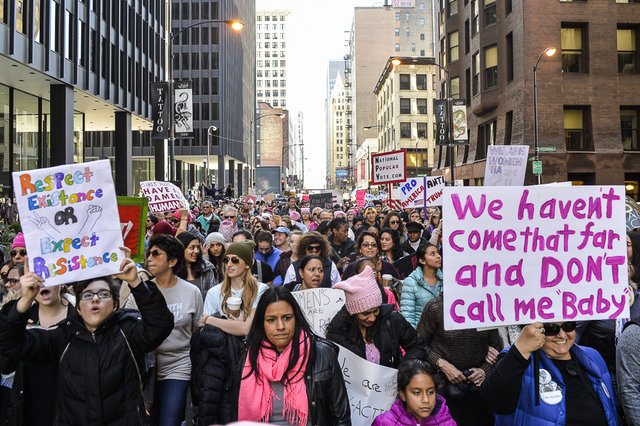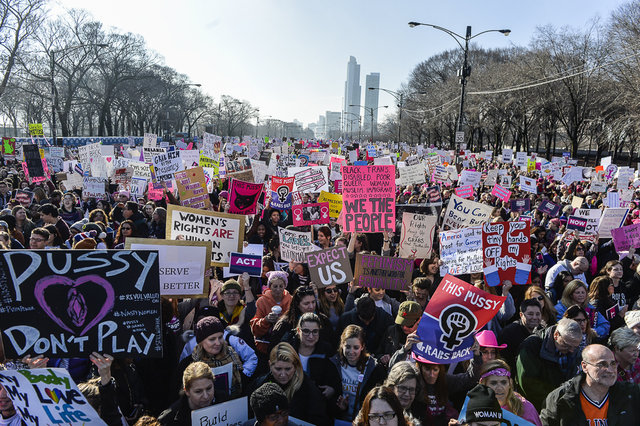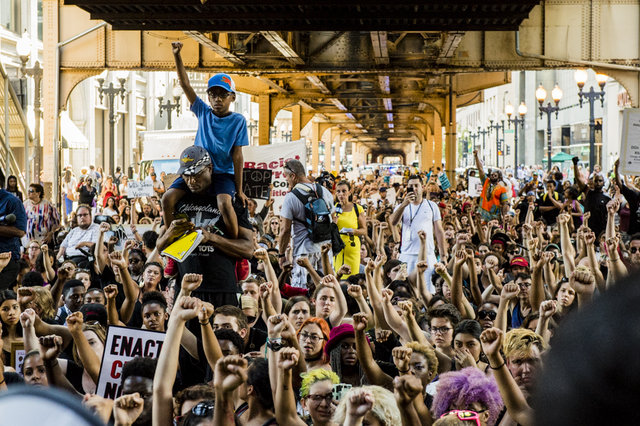After Women's March, Longtime Chicago Activists Answer 'What Next?'
By Stephen Gossett in News on Jan 24, 2017 9:22PM

Photo: Tyler LaRiviere
Saturday's historic Women's March on Chicago felt like a watershed moment, perhaps most of all for those to whom activism and protest are relatively new avenues. Even before the rally took place, one of the event's organizers, Liz Radford, told Chicagoist that it was always intended to be a jumping off point. With that in mind, we reached out to a few Chicago-based, veteran activists, for whom sustained action is a longtime pursuit. For everyone wondering, "What next?" here's the advice they offered.
Hoda Katebi, Communications Coordinator, Council on American-Islamic Relations:
"First of all, welcome. Thank you for expressing your solidarity and coming together to support a necessary movement. Moving forward, it is important to listen. Listen to those who are speaking from lived experiences and do not challenge their words. Center those who are on the margins and support their work and their leadership. Plug into organizing that challenges the complex interconnectedness of anti-Muslimism, anti-Blackness, imperialism, racism, xenophobia, homophobia and transphobia, and other systems of oppression. Be conscious of the space that you are taking up and use your voice to amplify those who are systematically silenced (and be careful not to speak over or for them)."
Brandon Lee, Communications and Research Coordinator of Asian Americans Advancing Justice, a member organization of the Illinois Coalition for Immigrant and Refugee Rights:
"For me there's an emphasis on thinking and acting and donating locally, especially in a city like Chicago. It's important to know that there are all sorts of groups that focus in an intersectional way, and are already doing incredible organizing. Some were visible at the rally, some weren't. When I was getting started in activism, I thought. 'where do I go? If you want to support reproductive rights for low income people, there's the Chicago Abortion Fund. If you're white and want to get involved in social justice, there's SURJ. If your'e queer and Asian, there's Invisible to Invincible. There are already so many of groups building community to tap into."
Lee stressed that victories on a federal level will be exceedingly hard to come by, so also advocate on a community and school-system level, such as working to make Chicago Public Schools commit to being sanctuary schools. He pointed to #100daysofresistance and ICIRR's ICIRR's Platform for Resistance, Unity, and Respect

Photo: Tyler LaRiviere
Ed Yohkna, Director of Communications and Public Policy, American Civil LIberties Union of Illinois:
"There are three important directions that we would recommend. One: people ought to—and I felt in that crowd—stay informed, as painful as it may feel every day to pay attention. Stay connected to your groups and to media; stay on top of what's going on.Two: struggle to pay attention to all issues, not just a couple—and this was often reflected in signage on Saturday. Have commitment across the board. If, say, reproductive health care improves, you don't get to not worry about trans equality, discrimination against Muslims or immigrant rights. Three: show up and show out. If you look at the success of the Tea Party getting coverage, there weren't that many people showing up, but enough were showing up and asking questions. And think about doing it beyond the context of elected officials. Keep calling those folks but find family members, colleagues, old classmates who live in exurban districts; engage them to be present."
One of our favorite pieces of writing to emerge after Saturday's rally was from Kelly Hayes, of Lifted Voices, who spoke, despite feeling conflicted, at the Women's March. Hayes wrote on Truthout:
"I hope everyone who started organizing on November 9 keeps building and learning, in spite of any mistakes. It was a beautiful community-building experience for many people. But we must acknowledge that, most of the time, the resistance will not be permitted, or feature celebrity performances. The resistance will be messy. It will sometimes strike you as offensive, and that might be because you have something to learn. We won't build forward if we don't build honestly."
Kofi Ademola, Black Lives Matter Chicago:
"Before I got involved with anything I did extensive reading: Stokely Carmichael, Marcus Garvey, Malcolm X, Martin Luther King, Jr., the list goes on. I wanted to study history and find out more about movements. As I progressed, I wanted to study feminism, particularly the black feminist movement and early ideas around intersectionality. So first and foremost, ground yourself in the history and stories, know that people are already doing the work and see what they’ve done. Ask questions and learn. Don’t think you're radical because you’ve come into an already existing space. Know your proximity to privilege. For example, I'm a black cis heterosexual male. I face discrimination but privilege over, say, a trans woman or a disabled, gender-non-conforming person. So, ask 'How do I center my voice to help most marginalized?...'"

(Demonstrators staged a massive sit-in in the Loop to demand police accountability and support Black Lives Matter Monday, July 11, 2016. Photos By Tyler LaRiviere/Chicagoist)
Eva Lewis, founder of The I Project and Co-organizer of Youth for Black Lives; a high school senior at Walter Payton College Prep:
"This is a really important time for society, a lot of people, black people especially, have been oppressed in the U.S. for forever, and this is the first time that a lot of other marginalized groups can feel the extent of what it means to be extremely oppressed—especially white women. The Women's March was extremely powerful. From where we were it looked very inclusive, all the speakers were inclusive, but when I started marching, I noticed that there was so much white feminism, and not a lot of inclusivity among the marchers. I think what's important in these times is to be inclusive and to understand, recognizing privilege. Even though our anger is righteous for sure, we can't be so consumed in our own problems that we don't recognize what other people are experiencing.
Noting that activism is not a "one-time thing," Lewis recalled seeing and agreeing with a sign that read, "I'm going to see all of you lovely white women at the next Black Lives Matter protest, right?" She wondered why there wasn't a similar outpour when Youth for Black Lives protested this summer against Chicago police misconduct and the shootings of unarmed black youth.
Lewis added that she hopes future Women's March-like events will be more careful about using inclusive language and making people who are not cis women and people of color feel more welcome.
"People kept saying "sisters," and I'm like, 'Well, everybody isn't a woman, what about trans women or non-binary folks?' you can't say you're trans inclusive and not be trans inclusive in your language. And someone said they wanted us to be like suffragettes —well, the suffragettes only did stuff for white women, and that made me uncomfortable. this lady said [she wanted us to be] like suffragettes, and like John Lewis and the civil rights movement... [and I thought] 'you couldn't even name a black woman!' It's really subtle, but language is really important.When Eloise Diaz Bahrmasel from the RISE Movement was speaking at the march, she said that 55 percent of white women voted for Trump, 'So y'all know you all did this, right? And if it wasn't you, it was your cousins, your friends. Holding people accountable in the way that makes people uncomfortable is so important. We don't have time to be comfortable, we don't have time to ease people in, and we have to hold people accountable."
Further reading:
Ways To Take Effective Action Following The Magnificent Women's March
How To Mobilize Your Election Fear & Anger Into Action In Chicago